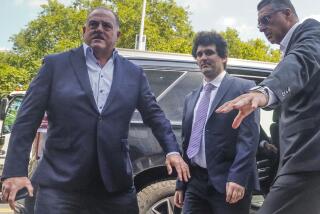Prosecutor Points to ‘Dishonor’ by Miller
- Share via
His voice rising in anger near the close of the Richard W. Miller spy trial, a federal prosecutor charged Wednesday that the former counterintelligence agent had disgraced himself and permanently stained the reputation of the FBI by passing a secret document to the Soviet Union.
U.S. Atty. Robert C. Bonner, responding to defense claims that Miller was actually trying to help the FBI by penetrating a Soviet KGB spy ring, pointed dramatically at the ex-agent as he made his remarks during closing arguments.
“Quite frankly, I don’t think Mr. Miller gave a second thought to his country,” Bonner said. “That’s one of the most preposterous defenses that’s ever been put forward to a jury.
“He disgraced and dishonored himself,” the prosecutor added. “By his conduct, he besmirched the name of the FBI and every loyal and dedicated agent who ever took the oath. The stain that Mr. Miller put on the FBI will dim in time, but it’s never going to be erased.”
Bonner’s comments followed a strong closing argument from defense lawyer Joel Levine, who charged that the FBI had a “preconceived notion” of Miller’s guilt and denied that Miller had ever passed documents to convicted spy Svetlana Ogorodnikova.
Describing Miller as a “bumbler” who should never have been placed on the Soviet counterintelligence squad in the FBI’s Los Angeles office, Levine pointed out that FBI officials knew before Miller met Ogorodnikova on May 24, 1984, that he had been excommunicated from the Mormon church for adultery and faced dismissal from his job for a chronic weight problem.
“Yet, as of May 24, there seemed to be no lights going off to tell the FBI that Richard Miller was a classically recruitable agent,” Levine said. “Why didn’t somebody figure that out?”
Levine focused specifically on the role played in the Miller case by former agent John Hunt, who had attempted to recruit Ogorodnikova as an FBI informant in 1982, and by the head of the FBI’s Los Angeles office, Richard T. Bretzing, a Mormon bishop who urged Miller to confess prior to his arrest Oct. 2, 1984.
“John Hunt is not on trial. Richard Bretzing is not on trial. But their judgment is on trial. Their expertise is on trial,” Levine said.
Responding to Levine’s closing remarks, Bonner denied that there were any improprieties in an FBI investigation--code-named Whipworm--which began after Miller and Ogorodnikova traveled to the Soviet Consulate in San Francisco on Aug. 25, 1984.
“The FBI is not on trial in this case. Mr. Bretzing and Mr. Hunt and all of the other men and women who have testified in this case are not on trial,” Bonner said.
“The only person on trial is right there--Richard W. Miller--that’s the man on trial,” Bonner added. “What you’ve seen in this case is what you see in any case investigated by the FBI--fine men and women doing their job, in utter contrast to that man right there.”
Bonner’s comments were abbreviated Wednesday because of a juror’s need to attend a class, and he is scheduled to conclude his closing arguments today. U.S. District Judge David V. Kenyon will then deliver jury instructions prior to the start of deliberations.
As soon as the jury left the courtroom Wednesday, defense lawyer Stanley Greenberg asked Kenyon to declare a mistrial and a judgment of acquittal on grounds that Bonner’s remarks were inflammatory. Kenyon denied the motion.
The closing arguments in the Miller case began Tuesday morning as Assistant U.S. Atty. Russell Hayman outlined the government’s evidence against the ex-agent, charging that he conspired with Ogorodnikova and her husband, Nikolai, to pass secret documents to the Soviet KGB.
Beginning the defense response, Levine said Miller had never passed documents to Ogorodnikova, admitting that he did so only because he was exhausted emotionally by FBI interrogators who questioned him for five days prior to his arrest.
“The predominant issue in the case is what Mr. Miller’s intent was in the summer of 1984,” Levine said. “Was he intending to be a spy or was he intending to be a double agent?”
As Miller’s wife, Paula, and two of his eight children watched, Levine urged the jury to decide the matter on the facts of the case and to give Miller the benefit of reasonable doubt.
“If you feel Richard Miller intended to be a spy in the summer of 1984, he does not deserve your sympathy,” Levine told jurors. “If you feel the evidence does not substantiate that charge, he does not need your sympathy.”
More to Read
Get the L.A. Times Politics newsletter
Deeply reported insights into legislation, politics and policy from Sacramento, Washington and beyond. In your inbox twice per week.
You may occasionally receive promotional content from the Los Angeles Times.










